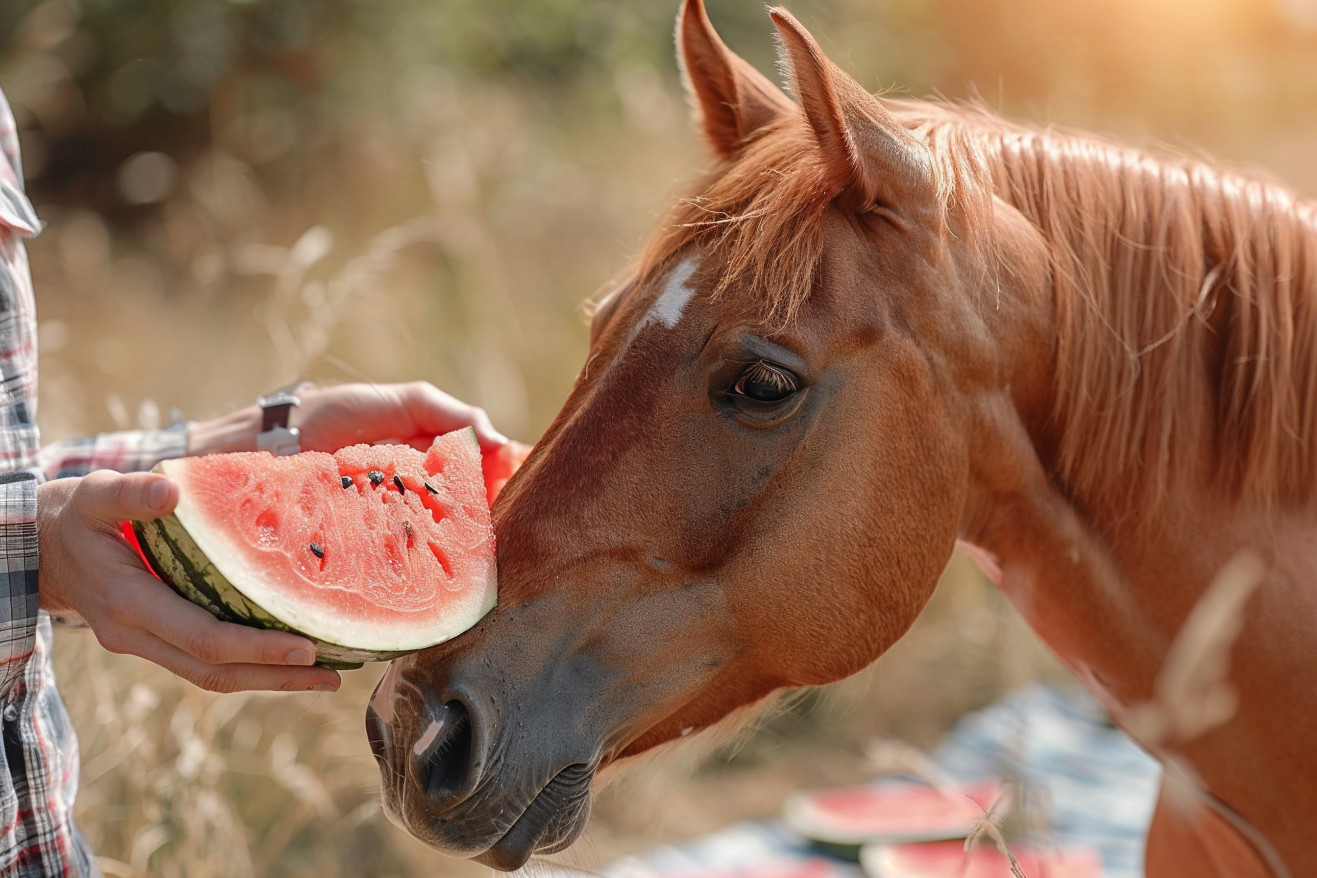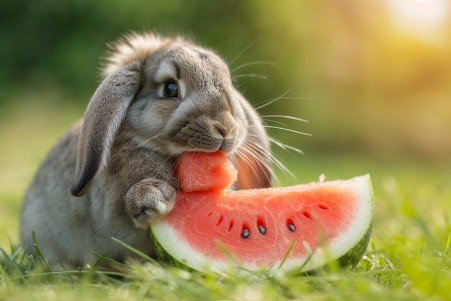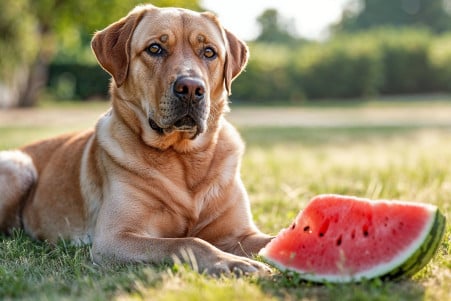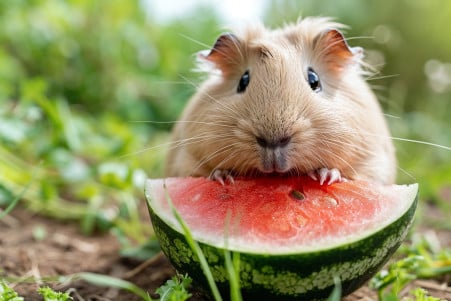Can Horses Have Watermelon? A Complete Guide to Feeding Horses Fruit
28 February 2024 • Updated 27 February 2024

If you’re enjoying the sweet tastes of summer, you may want to share your watermelon with your horse. And, yes, horses can eat watermelon, including the flesh, rind, and seeds, all of which can help keep your horse hydrated and provide vitamins A and C. That said, it can also cause digestive issues, so it’s important to feed it in moderation, and it’s not recommended for horses with certain health issues.
In this article, we’ll look at the role of watermelon in a horse’s diet, drawing on nutritional research and expert advice to help you understand the potential benefits and drawbacks. We’ll cover the sugar in watermelon, talk about why it’s important to limit how much watermelon you feed your horse, and look at the health issues that may require you to avoid feeding your horse watermelon.
We’ll also talk about the bigger picture of feeding horses treats, so you’ll have all the information you need to decide whether to feed your horses watermelon.
Can horses have watermelon?
What Nutrients Does Watermelon Offer Horses?
Watermelon is not just a source of water for horses; it is also a nutrient-dense food that can add several important nutrients to a horse’s diet. According to The Spruce Pets, watermelon is a good source of vitamins A and C, both of which are important for a healthy immune system and tissue repair. Watermelon also contains magnesium, which is important for muscle and nerve function, and phosphorus, which is important for healthy bones.
In terms of sugar and fiber, watermelon contains about 10 grams of sugar and 0.5 grams of fiber per cup of diced fruit. This is relatively low compared to the sugar content of pasture grass, which, according to American Farm Publications, can be more than 25% at certain times of the year. While grass and hay are the mainstays of a horse’s diet, watermelon can be a healthy addition due to its nutritional content.
Illumiseen also points out that because watermelon is 92% water, it can be a great way to help horses stay hydrated, especially in the summer or after a workout. Despite these benefits, watermelon is not known to contain any allergens or toxic substances that would be harmful to horses. While the seeds contain some toxins, which is common in fruits with seeds, the amount of seeds a horse would consume is unlikely to be harmful.
As a result, feeding watermelon to horses can be a smart way to supplement their diet with important nutrients and hydration. That said, it’s important to introduce watermelon to a horse’s diet carefully, as we’ll cover in more detail.
A Taste of Summer: Can Horses Eat Watermelon?
Feeding watermelon to horses can be a fun way to mix things up for your equine friend. According to Horse & Hound, start by feeding your horse small amounts of watermelon to see how they react to it. Feeding a few small pieces a couple of times a week can be a fun treat without overloading their system. If you have a smaller horse or pony, make sure to adjust the portion size accordingly.
As Illumiseen points out, you need to make sure to wash the rind of the watermelon thoroughly to remove any pesticides before feeding it to horses. You can use cold water and a brush to make sure it’s clean and ready to eat.
You can feed watermelon as a fun treat by giving them a juicy slice after a workout or as a supplement by mixing cubed watermelon into their regular feed. Horse & Hound stresses the importance of watching your horse for any changes in behavior or signs of digestive upset after you feed them watermelon. If you notice any negative effects, stop feeding them watermelon and talk to your vet.
Feeding your horse watermelon in a way that’s mindful of their needs will help ensure that you’re helping them stay hydrated and happy while also prioritizing their health and well-being.
What Horses Need to Stay Healthy and Where Watermelon Fits In
Horses require six main classes of nutrients to maintain their health. According to UGA Cooperative Extension, these classes are water, fats, proteins, carbohydrates, vitamins, and minerals. Of these, water is the most important, especially since horses can drink up to 15 gallons of water a day. This makes it especially important for horses to have constant access to clean water to avoid dehydration and other health problems.
Horses also need forages, like grass and hay, to make up the base of their diet, which can provide a lot of the carbohydrates and proteins that horses need. However, as AAEP points out, forage alone may not provide all of the vitamins and minerals that horses need, which means that they may need to be supplemented.
This is where watermelon can come in, as it can be used to supplement a horse’s diet with extra vitamins and minerals, like vitamin A and magnesium.
While horses can eat watermelon as a way to cool down and enjoy a special treat, it’s important that it’s introduced in a way that helps balance their diet rather than unbalance it.
This is especially important since, as the body of research on equine nutrition shows, horses can develop health problems if they get too many of certain nutrients from the treats they’re fed.
To avoid over-supplementing, treats like watermelon should be fed in moderation and in a way that supplements a horse’s regular diet of foundational forages and feeds. This way, horses can maintain the nutritional balance that’s so important to their overall health.
How to Minimize the Risks: Giving Watermelon to Horses Safely
Watermelon can be a refreshing, hydrating snack for horses, but as with any fruit, the sugar content in watermelon should be taken into account, especially for horses with insulin resistance. The Merck Veterinary Manual warns that high sugar intake can exacerbate conditions like insulin resistance and even trigger laminitis, a painful inflammation of the hooves.
Feeding practices, including the overconsumption of fruit, can also lead to gastrointestinal problems. The Merck Veterinary Manual notes that horses can experience diarrhea, colic, and weight loss due to sudden changes in diet or the ingestion of toxins. To prevent gastrointestinal issues from feeding watermelon to horses, it’s important to introduce the fruit slowly, watch for any adverse reactions, and feed it in moderation.
Horse owners with horses that have special health needs, such as Hyperkalemic Periodic Paralysis (HYPP), a genetic muscle disease, should talk to a vet. Horses with HYPP need to be on a diet that carefully controls their potassium intake, and while watermelon is low in potassium, it’s important to get a vet’s input to make sure that the fruit is a safe choice.
In general, horse owners should always be mindful of the food and treats they give their animals to prevent unintentional harm and keep their horses healthy and happy.
Sweet Rewards: Watermelon in Horse Training and Health
In the world of horse care, treats are an important part of training and building relationships between horses and their owners. According to ThinLine, giving treats like watermelon as a reward can help strengthen the relationship between horse and handler through positive reinforcement, which will help the horse learn to associate good behavior and compliance with positive rewards.
This approach, which is supported by the science of bonding, helps stimulate the release of endorphins, which will increase the horse’s happiness and willingness to work with their handler.
That said, EquiMed warns that using treats in training can be a slippery slope. In order to avoid teaching the horse bad habits like becoming mouthy or losing focus, it’s important to be strategic about when and how treats are used. For example, giving a horse watermelon after they’ve successfully completed a task will help reinforce the positive behavior without leading to any negative side effects.
In addition, watermelon’s role as a treat goes beyond behavioral training and can also help with horse hydration. As EQUUS magazine notes, keeping horses hydrated is a key part of horse care, and water-based treats like watermelon can be a big help in making sure horses stay hydrated, especially in the summer months or after a particularly hard workout.
By doing this, horse owners can safely and enjoyably improve a horse’s diet, which will help improve their overall health and strengthen their relationship with their human handler.
Enjoy the Slice: The Last Word on Horses and Watermelon
After looking at the nutritional value of watermelon for horses, it’s clear that this summer staple can be a fun and healthy addition to their diet. With its hydrating properties and high levels of vitamins A and C, watermelon can be a great occasional snack for our equine friends.
That said, it’s important to make sure that we’re giving them these benefits without any negative side effects, which means being mindful of portion sizes and keeping an eye out for any potential health issues.
It’s important to make sure that treats like watermelon are used to supplement a horse’s diet, not replace other sources of nutrition like forage and feed. This way, we can make sure that we’re giving our horses the nutrients they need while also giving them the gift of a cool, refreshing snack.
In the end, it’s important to make sure that we’re always putting our horses’ health first. By responsibly adding watermelon to their diet, we can help improve their quality of life, strengthen our relationships with them, and even contribute to their overall wellness, making every slice a way to show our horses that we care about and understand their needs.


